- Tuesday, 10 February 2026
A Retrospect Of 16 Years Of Republic System
On May 28, 2008, the first Constituent Assembly declared Nepal a Federal Democratic Republic, abolishing the 240-year-old monarchy. As agreed upon among the political parties, the first meeting of the first Constituent Assembly chaired by Nepali Congress leader Kul Bahadur Gurung in the capacity of the senior-most member of the Assembly made the epoch-making declaration.
Today, when we are marking the 16th Republic Day to commemorate the day, it is worthwhile to mention some key political incidents that prepared the grounds for the republican set-up and the gaps between public expectations and the actions of the political parties and their leaders in the new political set-up.
Although the communist parties were voicing for the abolition of monarchy right from the political change of 1951, they were not powerful enough to overthrow the monarchy and establish a republican setup. Even during the restoration of the multiparty system in 1990, the demand for a republican system was poorly raised by some communist parties. But when the Nepali Congress stuck to its policy of constitutional monarchy, the issue remained in the shadows.
The Maoists, which won nine seats in the 205-member House of Representatives in the 1991 general election, launched an armed revolt with the goal of overthrowing the parliamentary system and monarchy. Still, their armed insurgency could not be powerful enough to overthrow the monarchy until the royal massacre of June 1, 2001, in which the entire family of king Birendra was killed in the Narayanhity Palace.
After the demise of popular king Birendra, his brother Gyanendra became king. The royal palace massacre prepared solid ground to establish a republican system because the masses suspected foul play within the palace for the incident. The activities of the then crown prince Paras and growing enmity between the mainstream political parties and the king after the royal takeover of 2005 further fueled anti-monarchy sentiments, bringing the mainstream political parties and the Maoists together and culminating in the 12-point Delhi agreement.
Consequently, as guided by the 12-point agreement, joint peaceful demonstrations launched by the political parties, including the Maoists, in April 2006 killed two birds with a stone—it ended a decade-long insurgency and abolished the 240-year monarchical system.
However, due to the sharp divisions among the parties on other key political issues like the federal structures and their natures, it took over nine years for the political parties to institutionalise the changes through the constitution. Only in September 2015, the political parties succeeded in promulgating the constitution of the Federal Republic of Nepal. It may not be otherwise to claim that the devastating earthquake of April 25, 2015, played an instrumental role in bringing the divided parties politically together, and they succeeded in promulgating the constitution five months after the natural catastrophes.
Two constituent assemblies had to be formed through elections—in 2008 and 2013—to accomplish the task of institutionalising the republican set up through a constitution drafted by the people's representatives.
Now it has been nearly nine years since the promulgation of the constitution, and over the years, two general elections have been held as provisioned by the constitutions.
However, the sad fact is that the political parties that struggled hard to bring about the changes have done only little to institutionalise them and meet the people's expectations. Instead of working to institutionalise the hard-achieved changes and bring smiles to the faces of the people, the political parties and their leaders are giving more priority to reaching power or sticking to it than serving the people. Political instability has still been a distant dream because of the power-centric activities of the party le aders. We saw the formation of two or more governments in provinces in the last 17 months after the 2022 general elections, while in the centre, the Prime Minister changed coalition partners three times during the same period. As a result, people's frustration towards the leaders and the system has increased. The anti-change elements have gradually dared to raise their heads by cashing in on the growing public frustration. This is evident from the recent incidents in which pro-royalist forces drew large crowds, especially in urban areas, including the Kathmandu Valley.
Expectations
Political stability, rule of law, good governance, job creation, development, and prosperity are what the people have expected from the political change. However, the political parties seemed to have failed on all these fronts over the years, forgetting the sacrifices made by the martyrs. When political instability has become the order of the day, corruption has been thriving, and an exodus of youth continues in search of jobs and better opportunities abroad. The revelation of the involvement of an increasing number of leaders in different corruption activities like the fake Bhutanese refugee scam, the Lalita Niwas land scam, the Giribandhu Tea estate, and the Tikapur land scam, as well as the cooperative frauds, has only disappointed the people.
It takes decades to complete a development project, while corruption is rampant in almost all sectors. The parliament has been unable to formulate important laws, even those required for the effective implementation of the constitution promulgated eight years ago. Instead, the parties, which lack political cultures, tend to throw their full strength into trivial issues, taking the parliament hostage and keeping aside the important tasks. A people-elected parliament is a place to decide the major disputes and debates, but ours often turns into a battlefield for the ruling and opposition parties. We are witnesses to this now.
As we commemorate the 16th Republic Day, it is crucial for political parties and their leaders to reflect on the past 16 years and rectify any shortcomings. This introspection is crucial to ensuring that people reap the full benefits of the constitution and the notable political transformations it has accomplished. May this Republic Day be a source of inspiration for all to commit themselves to the betterment of the nation and its people.
(Deputy Executive Editor Gautam is the chief reporter of this daily.)



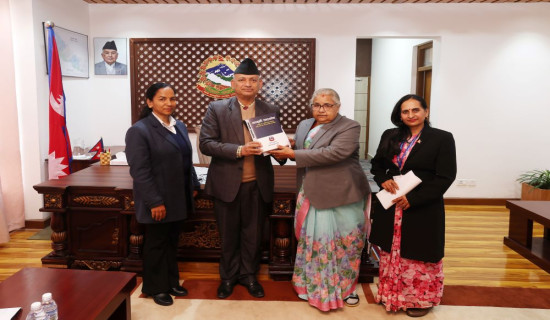
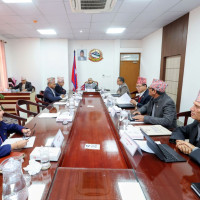
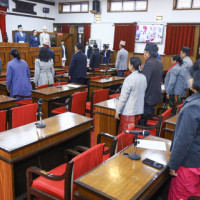
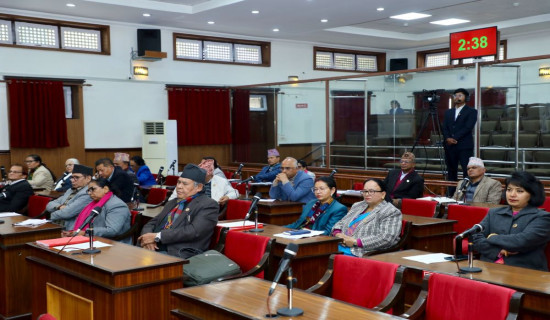
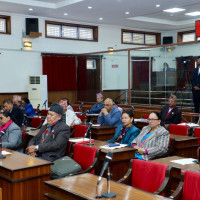

-original-thumb.jpg)






